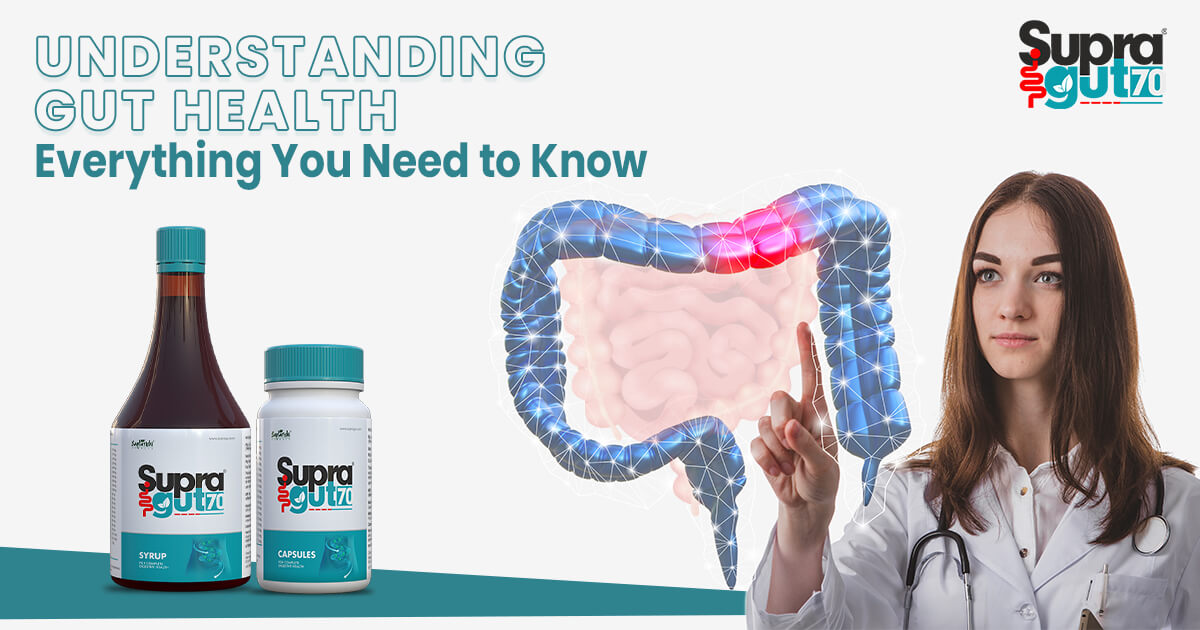
Gut Health plays an important role in the overall well-being of a person be it physically, mentally as well as psychologically. As the adage goes "Problems and power come from the Stomach." many health diseases and health complications are rooted in the gut.
Where a good and healthy gut fuels creativity and activity, an unhealthy gut can be the source of fatigue, mood swings, gut bloating and lethargy not to mention the autoimmune and other immunity-related disorders that can be caused due to poor gut health.
Thus it goes without a doubt that understanding your gut is the best way of understanding you. Your gut and health are connected and ensuring good gut health is that much more important for a healthy and productive lifestyle.
When we talk about how to improve gut health, being mindful about what we consume becomes a necessity of sorts. What we ingest has a huge impact on our gut microbiome, which in turn has a huge impact on our overall gut health and how healthy we are. So, let's start by learning about Gut Microbiome first.
Gut Microbiome
So simply put, a gut microbiome is like a community of different microorganisms like the bacteria living that call your gut home. Your Gut is home to millions of bacteria that are good for you.
I know it gives us creeps, but they are good for you, and not only that, they play a key role in your gut and health that goes unnoticed. Without them, it would be so hard for us to digest our Greek yoghurts and the broccoli that our mamas loved to feed us when we were young.
Our gut microbiome is a very delicate system and what we eat plays a crucial role in how balanced and healthy our gut microbiome is and in turn how healthy we are. An unhealthy microbiome can either be caused by the overuse of medication and antibiotics that kill and damage the good gut bacteria, which are responsible for our gut health, or by overactivity of one type of gut bacteria over the others in response to the food we eat. As they say “Too much of a good thing is a bad thing”. For example, this is the reason why we suffer from acidity when we eat too much Greasy, spicy or fatty foods, also known as barbeques.
Thus, eating gut-healthy foods is the first step proven to improve gut health.
Best food for your gut health
As we know, the Gut microbiome is a delicate environment. Poor eating habits, irregular meals throughout the day or simply gorging on your favourite food can wreak havoc on your delicate and balance-loving gut.
Also what we eat throughout the day plays a crucial role in improving gut health. The easiest way we can do this is by eating gut-healthy foods, such as green leafy vegetables, lean proteins, foods that are fibre, less spicy and more basic and probiotic foods such as curd and yoghurts, Legumes and fruits.
So, let's go all through all of them at a glance,
Green leafy vegetables
Green leafy vegetables such as broccoli, spinach, celery, cabbages, methi (fenugreek) and bathua (lamb's quarters) are known for their high fibre contents as well as being jam-packed with vitamins and minerals.
Including food in your diet that is high in fibre, low in calories and has a high mineral content is a great way to ensure good gut health. Green leafy vegetables are also basic so, if you are someone who loves spicy food and who suffers withy acidity, including green leafy vegetables in your diet is a must.
Whole Grains
Whole Grains such as Wheat, Brown Rice, Barley, and Oats are foods known to be full of fibre, micronutrients and antioxidants. Being a rich source of carbohydrates makes the not only satiating to you but also good gut bacteria.
Whole grains are also beneficial in indigestion-related issues such as constipation, and restricted bowel movements. Food like whole grain chapatis, mixed grain chapatis, brown bread, brown rice, and pulses are a great way to ensure your gut health.
Fruits with low sugar:
Low-sugar fruits such as chickus, Kwies, and Dragon fruits are a great way to keep your intestines microbiome healthy by cutting on excessive sugars, Fruites are a great source of antioxidants which help in maintaining the optimum pH of your gut at 6.7 to 7.
Fruits with Low sugars also help in curbing the issues related to indigestion such as gut bloating, acidity, constipation and much more.
Lean Proteins
Lean proteins are proteins which are more dense in lipid proteins and less dense in fats. Lean proteins such as chicken, mutton, and white flesh fishes are good sources of lean proteins.
These lean proteins are beneficial to improve indigestion by reducing the intestinal cramping band movements caused by the increase of fat and other greasy food in the intestine. Lean proteins also help in maintaining the pH of the gut microbiome.
Conclusion
Gut health is the core of living a healthy life. Gut and health are dependent on each other and ensuring good gut health is crucial for a healthier lifestyle. A lot of indigestion issues such as gut bloating, constipation, and restricted bowl moments can be resolved by maintaining a good gut microbiome.
Eating gut-healthy foods is the first step in the right direction and is proven to be the best way to improve indigestion and indigestion-related issues. Foods such as whole grains, leafy vegetables, fibre-rich foods as well as lean meat are the best food for gut health and are widely regarded as a great way to improve dyspepsia indigestion-related issues.